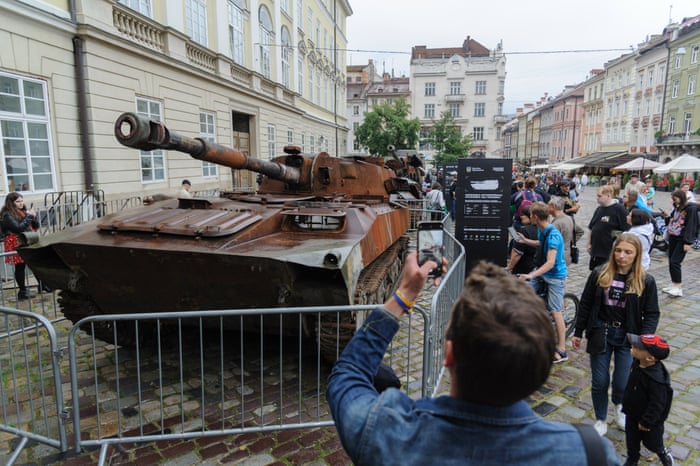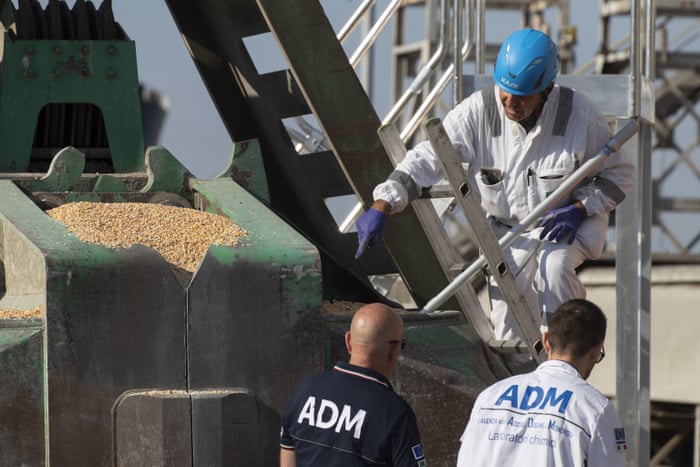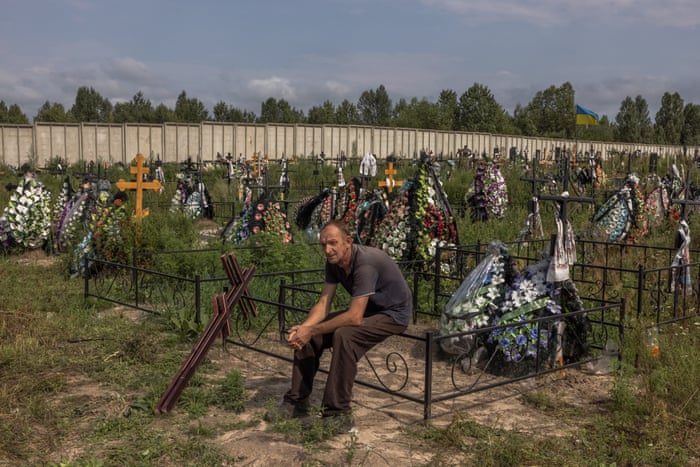Russia-Ukraine war: Moscow warns US over diplomatic ‘point of no return’ – live

Russia warns US over diplomatic ‘point of no return’
Russia has warned the US that potentially placing Russia on the US State Department’s list of state sponsors of terrorism could be a diplomatic “point of no return”, and trigger a total breakdown of relations between the two countries.
Alexander Darchiev, director of the Russian foreign ministry’s North American Department, was asked in an interview with Russian news agency TASS whether the possibility of lowering diplomatic relations between Moscow and Washington was being considered.
The diplomat said:
I would not like to go into hypothetical speculation about what is possible and what is not possible in the current turbulent situation, when westerners led by the United States have trampled on international law and absolute taboos in diplomatic practice
In this context, I would like to mention the legislative initiative currently being discussed in Congress to declare Russia a ‘country sponsor of terrorism’. If passed, it would mean that Washington would have to cross the point of no return, with the most serious collateral damage to bilateral diplomatic relations, up to their lowering or even breaking them off. The US side has been warned.
Any possible seizure of Russian assets by the US would completely destroy Moscow’s bilateral relations with Washington, Darchiev added.
We warn the Americans of the detrimental consequences of such actions that will permanently damage bilateral relations, which is neither in their nor in our interests.
Darchiev also said: “Americans are increasingly becoming more and more a direct party in the conflict.”
Key events
The Kyiv Independent reports that the Ukrainian military has shot down a Russian fighter jet, as well as four Russian drones.
⚡️Military: Ukraine shoots down Russian Su-25 jet.
Over the past 24 hours, the Ukrainian military also destroyed four Russian Orlan-10 drones in the east of Ukraine, the Joint Forces Operation reported on Aug. 13.
— The Kyiv Independent (@KyivIndependent) August 13, 2022



Ukraine’s health minister has accused Russian authorities of committing a crime against humanity by blocking access to affordable medicines in areas its forces have occupied since invading the country in February.
In an interview with the Associated Press, Viktor Liashko said Russian authorities repeatedly have blocked efforts to provide state-subsidised drugs to people in occupied cities, towns and villages.
Speaking at the health ministry in Kyiv late on Friday, Liashko said:
Throughout the entire six months of war, Russia has not [allowed] proper humanitarian corridors so we could provide our own medicines to the patients that need them.
We believe that these actions are being taken with intent by Russia, and we consider them to be crimes against humanity and war crimes that will be documented and will be recognised.
When roads and bridges have been damaged in areas now controlled by the Ukrainian forces […] it is difficult to get someone who had a heart attack or a stroke to the hospital.
Sometimes, we can’t make it in time, the ambulance can’t get there in time. That’s why war causes many more casualties [than those killed in the fighting].
The Ukrainian government has a programme that provides medications to people with cancer and chronic health conditions.
The destruction of hospitals and infrastructure along with the displacement of an estimated 7 million people inside the country also have interfered with other forms of treatment, according to United Nations and Ukrainian officials.
The war has caused severe disruptions to the country’s state-run health service, which was undergoing major reforms, largely in response to the coronavirus pandemic, when the invasion began in February.
The World Health Organization said it recorded 445 attacks on hospitals and other health care facilities as of 11 August that directly resulted in 86 deaths and 105 injuries.
But Liashko said the real number of casualties because of damages to the countries health and road infrastructure “cannot be calculated.”
Two more ships left from Ukraine’s Black Sea ports on Saturday, Turkey’s defence ministry said, bringing the total number of ships that have departed the country under a UN-brokered deal to 16.
Barbados-flagged Fulmar S left Ukraine’s Chornomorsk port, carrying 12,000 tonnes of corn to Turkey’s southern Iskenderun province, it said.
The Marshall Island-flagged Thoe departed from the same port and headed to Turkey’s Tekirdag, carrying 3,000 tonnes of sunflower seeds.
The statement added that another ship would depart from Turkey on Saturday to Ukraine to buy grains, Reuters reports.
The Estonian prime minister, Kaja Kallas, has again complained that the lack of comprehensive Schengen zone travel restrictions for Russians puts an “unfair” burden on countries neighbouring Russia, dpa reports.
Baltic states Estonia and Latvia have already tightened entry rules, with Finland mulling similar proposals. But Germany and the EU Commission reject a blanket freeze of Russian tourist visas.
Kallas said:
Europe has banned air travel from Russia to Europe. This means that the only way Russians can get to Europe is through only three countries – Finland, Estonia and Latvia.
So it’s not really fair that all other Schengen countries issue these visas, but the three of us actually carry the burden.
Kallas said the Kremlin’s hostile reactions to debates about travel restrictions showed that an entry ban for Russian nationals could be an effective instrument to complement other sanctions.
Earlier this week, Kallas tweeted:
Stop issuing tourist visas to Russians. Visiting #Europe is a privilege, not a human right. Air travel from RU is shut down. It means while Schengen countries issue visas, neighbours to Russia carry the burden (FI, EE, LV – sole access points). Time to end tourism from Russia now
— Kaja Kallas (@kajakallas) August 9, 2022
In response, former Russian president Dmitry Medvedev compared Kallas to a “Nazi”.
A day earlier, the Finnish prime minister, Sanna Marin, said in a TV interview that “it is not right that while Russia is waging an aggressive, brutal war of aggression in Europe, Russians can live a normal life, travel in Europe, be tourists.”
Here is the British defence ministry’s daily update about the war in Ukraine in full:
Russia warns US over diplomatic ‘point of no return’
Russia has warned the US that potentially placing Russia on the US State Department’s list of state sponsors of terrorism could be a diplomatic “point of no return”, and trigger a total breakdown of relations between the two countries.
Alexander Darchiev, director of the Russian foreign ministry’s North American Department, was asked in an interview with Russian news agency TASS whether the possibility of lowering diplomatic relations between Moscow and Washington was being considered.
The diplomat said:
I would not like to go into hypothetical speculation about what is possible and what is not possible in the current turbulent situation, when westerners led by the United States have trampled on international law and absolute taboos in diplomatic practice
In this context, I would like to mention the legislative initiative currently being discussed in Congress to declare Russia a ‘country sponsor of terrorism’. If passed, it would mean that Washington would have to cross the point of no return, with the most serious collateral damage to bilateral diplomatic relations, up to their lowering or even breaking them off. The US side has been warned.
Any possible seizure of Russian assets by the US would completely destroy Moscow’s bilateral relations with Washington, Darchiev added.
We warn the Americans of the detrimental consequences of such actions that will permanently damage bilateral relations, which is neither in their nor in our interests.
Darchiev also said: “Americans are increasingly becoming more and more a direct party in the conflict.”
The two primary road bridges giving access to the pocket of Russian-occupied territory on the west bank of the Dnipro in Ukraine’s Kherson region are now probably out of use for the purposes of substantial military resupply, British military intelligence said on Saturday.
Even if Russia managed to make significant repairs to the bridges, they would remain a key vulnerability, Reuters reported the UK’s Ministry of Defence as saying.
It said in an intelligence update:
Ground resupply for the several thousand Russian troops on the west bank is almost certainly reliant on just two pontoon ferry crossing points.
With their supply chain constrained, the size of any stockpiles Russia has managed to establish on the west bank is likely to be a key factor in the force’s endurance, according to the update.
Summary
Hello and welcome to the Guardian’s continuing coverage of the war in Ukraine. Here are the latest developments as it just passes 10am in Kyiv.
-
Ukraine’s military said its artillery hit a Russian ammunition depot near a key bridge in the south and added it now had the ability to strike nearly all of Moscow’s supply lines in the occupied region. Reuters reported there was no immediate comment from Russian authorities on the report of the attack in Kherson province, or the purported reach of Ukraine’s firepower.
-
The UN has urged a demilitarised zone around Zaporizhzhia nuclear plant as Russia and Ukraine trade accusations over more shelling. Ukraine’s nuclear energy company said the facility in the country’s south-east had been shelled five times by Russian forces on Thursday, resulting in staff being unable to change shifts. Valentyn Reznichenko, the Dnipropetrovsk region’s governor, reportedly said three civilians – including a boy – were wounded in overnight shelling on Friday in Marhanets, a town opposite the plant.
-
The Ukrainian president, Volodymyr Zelenskiy, has told government officials to stop talking to reporters about Kyiv’s military tactics against Russia, saying such remarks are “frankly irresponsible”. In the wake of major blasts that wrecked a Russian air base in Crimea on Tuesday, the New York Times and Washington Post newspapers cited unidentified officials as saying Ukrainian forces were responsible. The government in Kyiv, on the other hand, declined to say whether it had been behind the explosions.
-
The UK Ministry of Defence has said the explosions at the Russian-operated Saky military airfield in western Crimea earlier in the week were “almost certainly” from the detonation of up to four uncovered munition storage areas, though what set them off remained unclear. At least five Su-24 Fencer fighter-bombers and three Su-30 Flanker H multi-role jets were almost certainly destroyed or seriously damaged in the blasts, according to British intelligence.
-
The devastation at the Russian air base in Crimea suggests Kyiv may have obtained new long-range strike capability with potential to change the course of the war. The base is well beyond the range of advanced rockets that western countries acknowledge sending to Ukraine so far, with some western military experts saying the scale of the damage and the apparent precision of the strike suggested a powerful new capability with potentially important implications.
-
Ukraine’s security agencies issued a joint statement calling for the United Nations and the International Committee of the Red Cross to send representatives to locations where Russia is holding Ukrainian prisoners of war. The request on Friday follows earlier allegations by Kyiv that Moscow’s forces have tortured and executed prisoners, including by staging an explosion in a Ukrainian PoW camp in Olenivka.
-
Volodymyr Zelenskiy tweeted that he spoke with Pope Francis on Friday. “Informed about the aggression that the Russian Federation is carrying out against Ukraine, about the terrible crimes of Russia,” the president wrote on Twitter.
-
Ukraine’s defence minister, Oleksii Reznikov, has said a shipment of M20 MLRS tanks has arrived in Ukraine. In a tweet, he thanked the UK’s defence minister, Ben Wallace, and British people for the donation, which had been pledged earlier. “Your support is amazing and so important for Ukraine.”
-
Jose Andres, whose World Central Kitchen group has served more than 130m meals in Ukraine since Russia’s invasion in February, called for better coordination of food relief efforts ahead of what promises to be a brutal winter. Donations were easing as the war dragged on, he warned, which meant that WCK, which provides short-term emergency relief, must start winding down operations just as cold weather is likely to exacerbate problems facing millions of displaced Ukrainians.
-
India said on Friday there was no pressure on it from western countries or anywhere else over its energy purchases from Russia, as Indian firms step up imports of oil and coal from the country shunned by others for its invasion of Ukraine. India, the world’s third-biggest crude importer, overtook China to become the biggest buyer of Russian oil in July based on sea-borne volumes, having bought very little from Russia before the start of the war in Ukraine in February.
[ad_2]
Share this news on your Fb,Twitter and Whatsapp
Times News Network:Latest News Headlines
Times News Network||Health||New York||USA News||Technology||World News